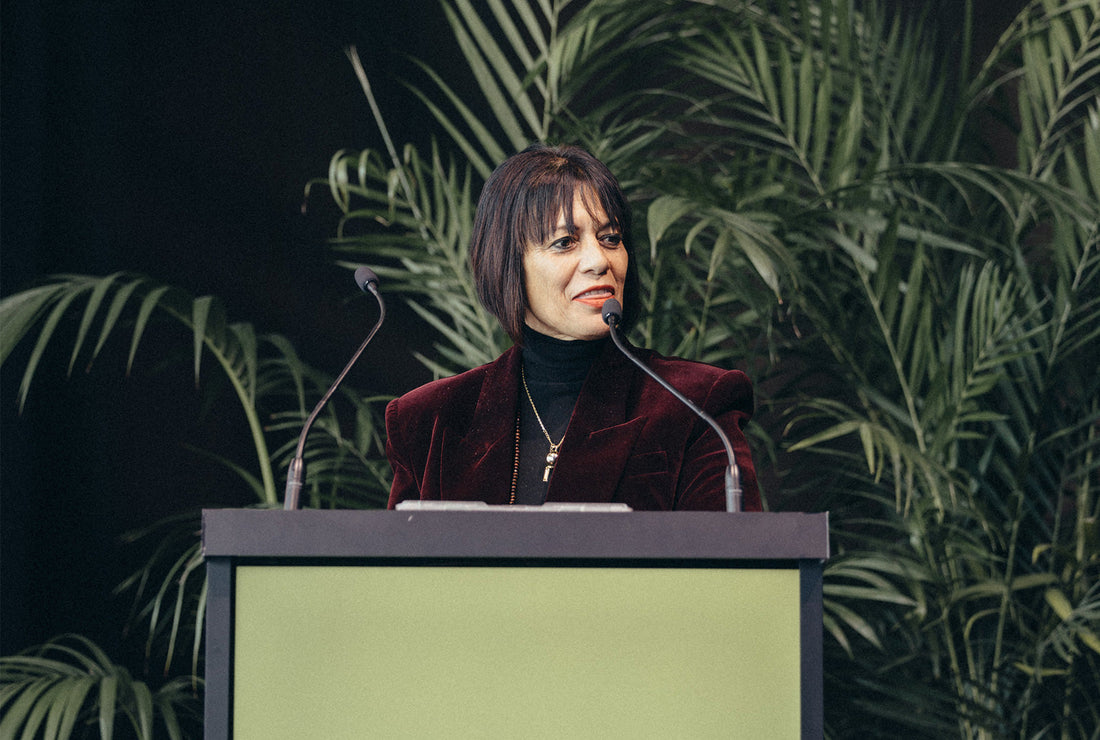“Whānau ora is reshaping the conditions of life. You can see clearly the evidence of a new social contract in Aotearoa – from dependency to empowerment, from welfare to wellbeing. Social Value gives us the tools to measure what really counts. This is the economy of wellbeing.”
When it comes to investing in impact, Awerangi Tamihere, COO of Whānau Ora, shared the key ingredients for success, as seen across the Whānau Ora network over the last decade embedding impact measurement practices. It starts with understanding what actually matters to those who will experience the impact firsthand and then it’s ‘keeping the line true’ by collecting evidence with cultural intelligence and measurement integrity. “Social Value is not just an outcome – it is woven into our everyday practices, our culture and wired into our DNA as Whānau Ora.”
Tamihere opened with a zoomed-out frame of reference that brought everyone in the room to the conversation, posing the question: “What does success really look like for us as a nation? Is it measured only in GDP? Or is it found in the wellbeing of whānau (families) – the strength of communities? When a whānau finally secures safe housing, rangatahi (youth) connect with their language, kaumātua (elders) feel valued and supported. GDP cannot tell us these things.”

She spoke to the essence of Whānau Ora – as a movement of change that is not simply an operating model but a commitment to the flourishing of whānau and communities. This aspiration-based guiding star is then grounded in locally relevant research. Rethinking reporting not as compliance but as storytelling, as learning – and evidence as taonga (a culturally valuable resource) – so as to illuminate and generate new perspectives and ideas for moving forward. Underpinning this is what Tamihere calls ‘the spirit of change’ – something you feel through lived experience and yet is often only truly understood with a reflective deep dive into the multitude of factors that effect change.
While at the helm of this multifaceted network of care and community, Tamihere saw, “While priorities differ community to community – the core remains the same. Our job is to provide scaffolding, tools and support so whānau can build their own pathways.” The connected network of Whānau Ora partners across the North Island of Aotearoa, NZ have spent the last decade developing their own unique ‘Schools of Change’ – where outcomes are crafted locally, data and evidence drive decisions, and communications amplify whānau voice resulting in each collective collecting their regional story.
This evidence becomes taonga because it is then reported back to communities, designed to be seen, spoken to and engaged with. “So whānau, kaimahi and partners can recognize their mana (authority) in the evidence. At every level the data remains taonga – living, breathing and valued.” What is really compelling here is that whānau, who quite often have been reduced to negative statistics, can now trust the data because it is grounded in their reality. “These are not just dashboards – they are taonga. Because they carry the voices, the goals and whakapapa (history) of whānau, they hold the evidence of struggle.”
Whānau Ora has been an example on the world stage for doing things differently and Tamihere knows firsthand, from her experience contributing to the global conversation around Social Value, why it has resonated with audiences around the world: “Indigenous knowledge systems are globally relevant models for wellbeing and sustainable progress.”
The cornerstone of this is that it re-imagines system design to support the health and wellbeing of whānau as defined by whānau. The approach is unique in that it centres aspiration as a vessel for navigating whānau in crises back onto pathways that lead to flourishing futures. Tamihere said it was a simple but revolutionary shift: “We asked a different question: What are your goals? What do you want for your whānau?” which was consistently met with appropriately simple answers: “A stable home, tamariki (children) settled in school, the ability to provide for themselves.”
The seed of Whānau Ora was sown more than three generations ago from the hard work and wisdom of the grandmothers who founded the movement based on restoring hope, confidence and self-determination for whānau. These community leaders saw traditional funding models and schools of thought regarding the socioeconomic challenges within Aotearoa had not forecast the future of wellbeing economies thinking that was already happening around the world.
Whānau Ora has developed into an internationally recognized operating model and notably, the acclaimed programme Ngā Tini Whetū, designed in collaboration with Tā Mason Durie’s life’s research, has contributed thought leadership to the changing global economic landscape. Over this time, supported by a strong organisational backbone team with a clear vision, Whānau Ora community leaders and navigators across the North Island have leveled up from service providers to leaders of transformation.
To conclude, and spoken with the true wisdom of the grandmothers before her, Tamihere laid down the mānuka for the next chapter: “Impact is built on balance, evidence is held on taonga and the glue that binds it together is trust. What we build together only lasts if we keep it steady, true and balanced.”


